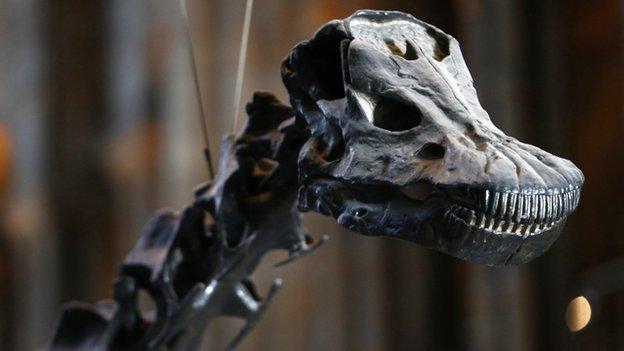How to say: Diplodocus
- Published

The Natural History Museum in London is removing the model diplodocus skeleton which has stood in its entrance hall for 44 years. But how should the creature's name be pronounced, asks Justin Parkinson.
It's a big word for a big beast. Weighing more than 15 tonnes and broad around the hips, the diplodocus was quite an animal.
Generations of UK dinosaur enthusiasts have grown up speaking of a "DIP-lo-DOH-cus". CBeebies presenter Andy Day recently did the same in a rap song dedicated to the long-necked herbivore.
The poem I'm a Diplodocus, by Judith Nicholls, external, distributed to primary schools in 2005, also emphasised the first and third syllables, in one stanza stating:
Hocus, pocus,
plodding through the swamp;
I'm a diplodocus,
chomp, chomp, chomp!
But some, particularly in the scientific community, prefer to call the diplodocus, which lived in North America about 150 million years ago, the "dip-LOD-er-cus". The BBC's Walking With Dinosaurs did this in 1999, as per the BBC Pronunciation Unit's advice.
The Oxford English Dictionary, external rules that both pronunciations are valid. But the Natural History Museum, which is moving its own diplodocus model, conveniently named Dippy, offers its own, third version - "DIP-low DOCK-us", external. It says this is because its name is the combination of the two Greek words - diplos (double) and dokos (beam), a reference to the formation of bones on the underside of its tail, external.
The BBC's Pronunciation Unit is also aware of a fourth possibility - "digh-PLOD-uh-kuhss" - the "digh" sounding like "high".
The first diplodocus remains were discovered in 1877 by another pronunciation poser, Yale University's Othniel Charles Marsh. The American Journal of Science was using the word as early as 1884.
Paul Upchurch, professor of palaeobiology at University College London, says "dip-LOD-er-cus" is used by experts from all over the world. "If I stand up on a stage and say it at a conference, it's the way of saying it that's going to seem the least weird," he adds.
But he thinks the pronunciation favoured by children is possibly more technically correct.
"Dinosaur names are made up from Latin and Greek, so they're not real old words," Crispin Little, a palaeontology lecturer at Leeds University. "It's up to you how you pronounce them."
Visitors to the National History Museum often ask for the correct pronunciation of Dippy's full name. "Our lead scientist prefers DIP-low-DOCK-us, but it's a word that you can't say wrong, basically," a spokeswoman says.
The diplodocus model is to be replaced with the skeleton of a blue whale - pronounced "bloo whayl" with no variants, according to the OED.
Subscribe to the BBC News Magazine's email newsletter to get articles sent to your inbox.